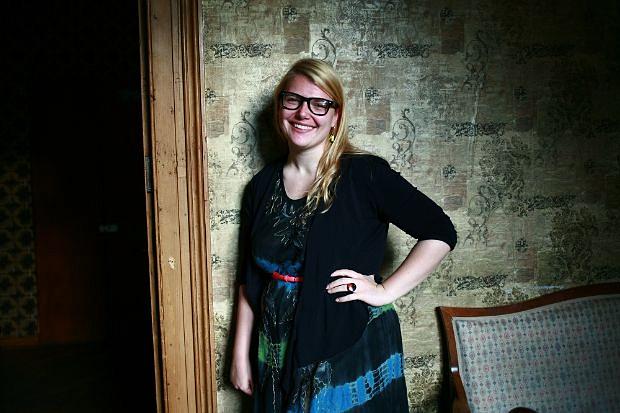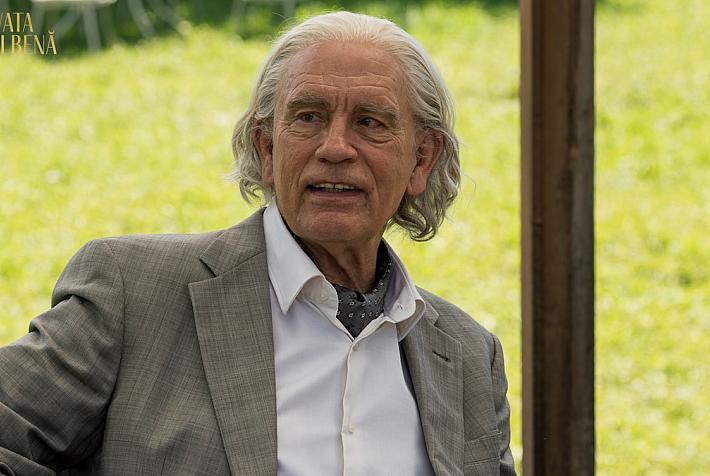The world: Hannah Wolf’s home for bold theatre

A young North-American theatre director comes to Bucharest for nine months and gives birth to cross borders projects.
A 20-something American girl wearing sneakers, a green dress under a black sweater and indie glasses talks to a group of five actors and a playwright in a room at the National University of Theatre and Film, in Bucharest. Hannah Wolf, who is a theatre director and dramaturg, used to think of herself as a small town Alaska girl. Then she moved to New York and became a serial intern, the term used for those going from internship to internship. Now she's in Bucharest, with a Fulbright Grant. Her nine-month residency here is about to end and she just met the actors who'd act in her project called "My New Jeans from H and M".
With a friendly, confident voice she starts talking about her project. “Basically in December I approached four American playwrights and four Romanian playwrights, and said, hey, I have this idea about cross borders playwriting. Are you interested? And they said, yes, so here’s your prompt, please write a ten-minute play. And the prompt was “My new jeans from H and M.” This has been like a six-month process and now we get to put it on its feet. I’m super excited to have this happen and to have everybody on this journey. That’s my spiel, that’s it. Do you guys have any questions?”
At first there are a few moments of unsettling silence, but then a girl with short hair called Katia wants to hear more about the theme of this project. Hannah explains that she has noticed that everyone’s parents in Romania seem to have a story about their first jeans, something like "I remember how cool it was when I got my first pair of jeans", whereas their children, this new generation, can go buy jeans at 30 lei at H&M, jeans that don't mean anything anymore and are just a wash. Basically, a story about corporations and their universality, she says.
"Also, thank you for knowing English," Hannah adds. "It's thanks to the globalisation," Katia answers laughing.
The jeans factory that brought chaos to the forest
In the meeting room, besides the five actors, there is also the Romanian playwright Mihaela Michailov, a tiny, smart-looking woman, who wrote the play the actors are about to read now for the first time, called “Jeans in the forest”. It's a ten-minute piece about animals happily living in a forest, until they get an irresistible offer- to have a jeans factory in their forest, an offer which will split the animals in two groups. Katia, the short-haired girl will play the wolf, while the others will be the bear, the squirrel, the fox or the rabbit. The first reading starts, the actors get into their fox or squirrel personality, while Hannah listens very carefully to them, taking notes, and following the translation of the play into English.
"I went into directing thinking that I could control, and I found out through years that it's not about control, it’s about editing," she told me a few days before the rehearsal, while drinking a beer at the cafe where we met. "I started as a director, and I was like: you, actor, you’re gonna move here, you’re gonna turn your head these many times and then I realised that directing is more about communicating and being able to talk to people."
Now the debate among the animals goes on, and the only one who rises against the factory is the squirrel, played by a young, calm actress from Arad, who's going to Copenhagen in a few days and whose favourite colour is beige. "This is the end of our forest," the squirrel proclaims, but the animals don't really seem to care about these sentimental arguments. They prefer to think about the benefits of a forest where everything is made up of jeans, including the sun beams. However, when the rabbit faints, due to the work overload at factory, the animals start understanding the consequences.
"That was great," Hannah says after the first reading ends. "The rhythm was really good for the beginning. Because what is really important about this ensemble piece is the rhythm." She thinks a bit and then she adds." What if you imagined you are Disney characters, with big eyes, strong reactions. Try to find this Disney voice." "Basically the play is a dystopia. It's about a dream world dreaming and then waking up from the dream," Mihaela adds.
The first play that changed my life
Hannah grew up in Juneau, the capital city of Alaska, an isolated city with wooden houses and 20,000 people, surrounded by mountains and water. "I grew up without TV, it was very limited what we could watch," Hannah says. "I spent a lot of my high school years trying to fit in and feeling really awkward and out of place, like all teenagers. When you’re a teenager you’re always the other. Every teenager is incredibly self obsessed. I went to theatre camps, I like to joke that I was an attention whore as a child, but too shy to do anything about it."
What really made her decide to go into theatre was an investigative theatre piece called columbinus, created by the United States Theatre Project, that she saw for the first time when she 17, in 2004. It was five years after the Columbine High School massacre, when two senior students murdered 12 students and one teacher. That spring Hannah was in her senior year, she was about to graduate and there were bomb threats at her school. Everyone was a little bit on edge and they were talking a lot about school shootings in the class. "And then I saw this play, and I was like mind blown."
"It was a play about school shootings. The moment they are in school and the actors are holding guns, instead of having recorded gunshots, they’re hitting the chalkboard. For me that moment changed my life. It was so striking taking a symbol, a sound and changing it, that hit me to the core, and that still stays with me, and that's why as a director I'm so obsessed with symbols and rituals. It comes from that. I saw that piece many times, I think my parents questioned why I went to that play repeatedly," she says laughing.
It wasn't really until college that she started doing theatre. She enrolled at a liberal arts school and took general courses, but she just kept going back to the theatre course. "That was where I really felt at home and where I wasn’t just a face in a class of 500 students. I like to say that I woke up one morning and I knew that I had to be a theatre director. I was 19 or 20 back then."
While Hannah is talking about this play, I notice that she has something written on her hand. She laughs. "When I was a kid I swam. I started swimming competitively when I was 8 and because there were like 100 kids in the pool, the coaches would write what event you were in, what lane you’re gonna swim in, so you could look at your hand and know where you need to go. There were like 12 events on your hand and you were checking them off. It’s an easy notepad."
New York, I love you, but you're bringing me down
Hannah graduated in 2009, which she says was the worst year to graduate in the United States. There were no jobs, so she boomeranged back home and found a theatre in Alaska that she worked at for two years. But she hit a point where she realised she wanted to make theatre her career and in Alaska that wasn't really possible. "I either work a day job in Alaska and then do theatre at night, and it becomes my hobby, or I pursue this career and go elsewhere," Hannah remembers her choice at the time.
So she moved to New York in 2011, the hot thing for playwrights right now. "I was terrified of New York. I was like: I’m a small town Alaska girl, I don’t think I’m ever gonna move to New york. It’s not for me. And then I got a job in New York, an internship at the Vineyard Theatre, which is an Off Broadway theatre, and it was like, ok, I’m moving! and I’ve packed all my stuff."
At the Vineyard Theatre, whose slogan is “New York’s home for bold theatre”, Hannah was in the literary department, reading scripts and going to readings. "I really learned how to work with the playwrights, and to not necessarily read a script and decide if I liked it or not, but read it and look at another level, what was this playwright trying to do, did they achieve that and how can I help this playwright get to where I think they want to go."
But New York is tough, Hannah says. "New York is a bitch. There's just so many people and so much cool stuff going on, but it’s also so tiring. If you’re down, New York doesn’t care. New York will continue to push you down."
She worked three different part time jobs there. "Monday I’d be teaching playwriting or doing admin work at a creative writing lab for kids, Tuesday I’d be selling beer and Wednesday I’d be the literary resident of this theatre and also selling beer and next day I’ll be in rehearsal for another project, so a lot of juggling. In New York everybody does that, everybody is working like 20 hours a day. Working a lot is the American culture, but New York is even double."
It was not always easy for her. "I think in any career you have those moments when you say, I'm gonna quit and go off the grid, or sail the world or something, and with theatre you really have to know why you’re doing what you do and in New York you have to know why you’re there," Hannah says. "I don’t think I’m gonna be in New York for my entire life, it’s just sooooo exhausting, but as long as I’m in my 20s it’s a really good time to be living with three roommates, in our apartment in Harlem."
Her three month internship at the Vineyard Theatre turned into a year long internship which then turned into a paid residency. "In my second year there I started to get space. If the playwright I was working with clicked really well, the theatre would give me space so I could do workshops and invite people to see that."
She’s called an emergent director in the US, which is having passed internships but not necessarily a director, and this timeline could last years. "I could be an emergent director until I’m in my forties. That’s the big joke now, it’s like no one actually emerges."
Skip Broadway, go to Bucharest
A lot of her peers were looking at Broadway, but Hannah thinks Broadway is a machine and says that she’s not that interested in that. “Well, I’m interested in seeing inside that machine, but that’s not my ultimate goal.” After some time in New York, she felt that she needed to start researching opportunities to go overseas. “I feel that there is a train right now of nationalism on the rise, but I’m kicking around this idea that I actually have more in common with people of my generation no matter where they are from, than people of different generations of my own country.”
She came across a book of Romanian playwrights from about ten years ago that has been translated to English. “I was really taken by the way they are writing. They really write like they have nothing to lose. In comparison most American playwriting is very safe, because they are writing to be produced,” Hannah says.
So she came to Romania to find out what is the new generation of playwrights doing, but the reality on the ground was a bit different. “There are some writers here, but the independent scene here gets no support. No state support. The opportunities are very, very rare. This year became less of finding the new playwrights and more of how do I support the writing that is happening?”
Meanwhile the animals in the wood continue arguing about whether they should accept the factory or not. “Could you make the wolf sound as if he were old?” Hannah suggests the short-haired girl. “Sure, I was actually thinking about that,” Katia answers and right away an old, wise wolf shows up in the room. The rabbit seems spoiled and thinks only about carrots, but for the moment Hannah doesn’t pick up on him. However, the bear needs to find a new voice, she thinks, and he agrees right away. “Of course”, the bear says. The third rehearsal is about to start.
The reading of the “My New Jeans from H and M” project will be performed in Romanian at Teatrul Foarte Mic, on Tuesday, May 13, at 19:30–21:00. Free entrance.
By Diana Mesesan, features writer, diana@romania-insider.com
(photo by Diana Mesesan)











